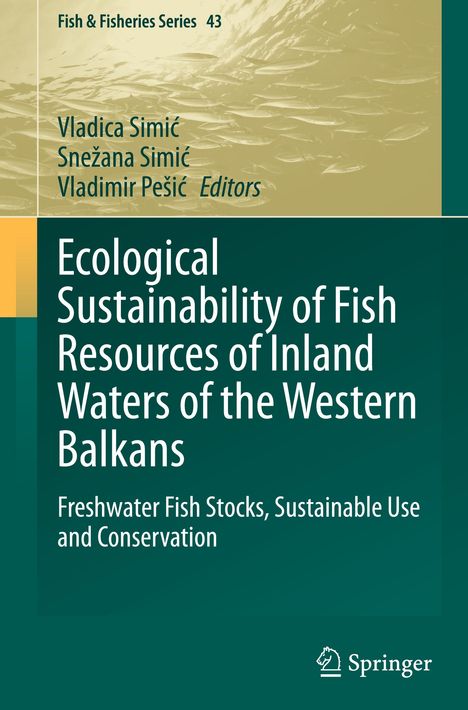Ecological Sustainability of Fish Resources of Inland Waters of the Western Balkans
Ecological Sustainability of Fish Resources of Inland Waters of the Western Balkans
Buch
- Freshwater Fish Stocks, Sustainable Use and Conservation
- Herausgeber: Vladica Simi¿, Vladimir Pe¿i¿, Sne¿ana Simi¿
lieferbar innerhalb 2-3 Wochen
(soweit verfügbar beim Lieferanten)
(soweit verfügbar beim Lieferanten)
EUR 234,68*
Verlängerter Rückgabezeitraum bis 31. Januar 2025
Alle zur Rückgabe berechtigten Produkte, die zwischen dem 1. bis 31. Dezember 2024 gekauft wurden, können bis zum 31. Januar 2025 zurückgegeben werden.
- Springer International Publishing, 01/2024
- Einband: Gebunden, HC runder Rücken kaschiert
- Sprache: Englisch
- ISBN-13: 9783031369254
- Bestellnummer: 11728323
- Umfang: 732 Seiten
- Nummer der Auflage: 24001
- Auflage: 1st ed. 2023
- Gewicht: 1250 g
- Maße: 241 x 160 mm
- Stärke: 45 mm
- Erscheinungstermin: 1.1.2024
- Serie: Fish & Fisheries Series - Band 43
Achtung: Artikel ist nicht in deutscher Sprache!
Klappentext
This book provides a detailed evaluation of the hydro-ecological characteristics of the Western Balkans, an area characterized by still preserved inland waters and fish resources important for the European continent, as well as the biodiversity of inland waters important for the planet Earth. Freshwater ecosystems cover only 1% of the Earth's surface; however, they are a habitat for about 40% of fish species. At the same time, inland fisheries make less than 12% of the world's global fish catch, with 43% coming from low-income and food-deficient countries (Africa, South America, Southeast Asia).In Europe, the Western Balkans have significant fishing waters and fish resources, including the Middle Danube drainage (Sava, Drina, Velika Morava river systems), large ancient lakes (Skadar / Shkodra, Ohrid, Prespa, Dojran), and the Adriatic basin characterized by endemic and commercially important species. However, in contrast to the high fishing potential in a significant part of the Western Balkans, diverse and specific political, economic, and social factors largely had a negative impact on the state of fish resources.
This volume is multidisciplinary and provides a sound knowledge base for scientific and practical fisheries. In addition, it may be a valuable guide for managers and conservationists worldwide to adapt methods and procedures for the ecological sustainability of fish resources under specific local, natural, and socio-economic conditions. Finally, the content is a good reference for natural sciences and agriculture students studying fish, fish resources, and fisheries sciences. It would improve their knowledge and perspectives on the challenges of sustainable use and conservation of inland water resources.


